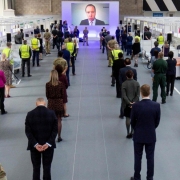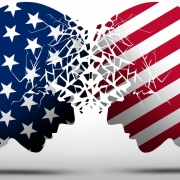There is increasing awareness of and dissatisfaction with the attributes of centralized systems. Centralized systems create what Nassim Nicholas Taleb famously highlighted as fragility, the inability of a system to recover from crisis events.
Our political, legal and economic system is Exhibit A. “Democracy promotes centralization and centralization brings fragility”, according to Morten Arisson. Accordingly, many social thinkers make an effort to conceive of social systems that are not centralized and can avoid the systemic risk of crisis and fragility.
Individual Freedom According To Social Thinkers.
Let’s take just one such concept, simply as an example of social thinkers’ conception of non-centralized systems: anarcho-capitalism. This is a theoretical idea of libertarians for a self-organizing social system without central government, free of the state and its interventions. The core idea is conceptually attractive, although anarcho-capitalism an ugly and tortured sounding term. It is also horribly difficult to define, impossible to project into the real world, and a dead end for innovative thinking. There’s no design there.
The capitalism part intends to mean that free markets based on mutually voluntary exchange will provide the operational norm, and the anarcho part intends to mean that there are no rules centrally imposed by, for example, a government. Sounds good, but none of the social thinkers has ever been able to design a pathway to get to the end-state from where we are now, or a credible description of how the system would work if we ever did get to implement it. It’s idealistic, at best.
Individual Freedom as a Technological System.
In contrast, technologists have not only conceived of non-centralized anti-fragile systems, they’ve designed them and built them and now those systems are operational. Distributed computing provides one example. Software exists in the form of components located on a network of computers with no hierarchy. The software components communicate with each other and co-ordinate their actions by passing messages. They can interact with each other to achieve a common goal. Those interactions can be peer-to-peer, i.e. one software component to another without an intermediating function between the two. There is no central direction.
One of the better known distributed computing systems is the distributed ledger system, often known by the term blockchain. A shared ledger is distributed across multiple sites, and a consensus of replicated, shared, and synchronized digital data is generated by transactions. Each transaction is cryptographically confirmed, verified and time-stamped. A peer-to-peer network enables the transactions, which are replicated across network nodes. There is no administrator or centralized data storage.
Technology Implements, Users Improve.
The technical language can be as opaque as sociological language. However, the point is not that the engineers communicate in this new form of language using words that are strange to the ear. (Just like anarcho-capitalism is strange to the ear.)
No, the point is that the engineers can actually design and build this system that they describe so strangely, and operate it and make it relevant in the real world. Blockchain is famously known as the software on which bitcoin and other crypto-currencies are hosted. It is functional, has attracted multiple users, and is operating as designed. Distributed ledgers are expanding, becoming more robust and finding new applications.
Spontaneous Order – Users Discover New Applications.
And, at the same time, blockchain users are discovering that distributed systems can do more for individual freedom than anarcho-capitalist theory. Finance pioneers are aiming at developing entire financial ecosystems on the blockchain, including lending and borrowing, registration and trading of financial instruments, and payment systems, with the entire system existing independently of banks, both central banks and commercial banks. Political pioneers are designing new political systems that can operate on the blockchain, keeping in touch with constituents continuously, seeking their input on all issues at all times, aiming at replacing representative government and periodic voting with “liquid democracy”. Legal pioneers are replacing bill-by-the-hour interpretive legal services with smart contracts – software rather than lawyers, with automated functionality.
All of these initiatives are early experiments and may or may not work well initially. But they do work. And they’ll be improved by users who identify ways to make them work better. They’ll be refined by marketplace activity. A new world is being created by technology and technologists.
Technology Will Improve Our Civilization More Than Social Thinkers Can.
The social thinkers can think conceptually. But they can’t design and can’t implement. That’s why the next phase of civilizational improvement is in the hands of technologists.










